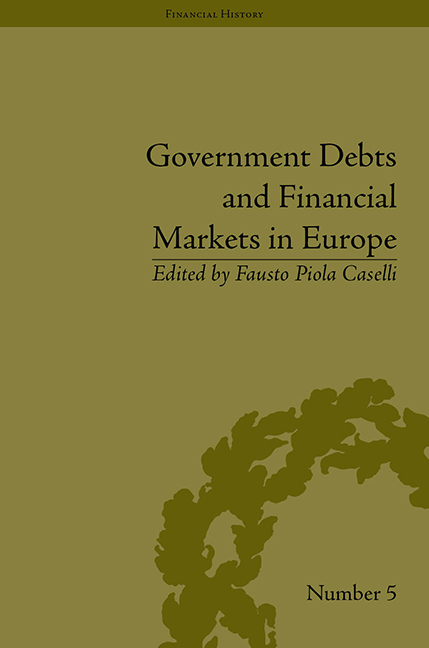Book contents
- Frontmatter
- CONTENTS
- Contributors
- List of Charts and Tables
- Introduction
- 1 The Financial Administration of North Hanseatic Cities in the Late Middle Ages: Development, Organization and Politics
- 2 Government Debts and Credit Markets in Renaissance Italy
- 3 Government Debts and Financial Markets in Castile between the Fifteenth and Sixteenth Centuries
- 4 Government Debt and Financial Markets: Exploring Pro-Cycle Effects in Northern Italy during the Sixteenth and the Seventeenth Centuries
- 5 Government Policies and the Development of Financial Markets: The Case of Madrid in the Seventeenth Century
- 6 The Role Played by Short-Term Credit in the Spanish Monarchy's Finances
- 7 From Subordination to Autonomy: Public Debt Policies and the Creation of a Self-Ruled Financial Market in the Kingdom of Naples in the Long Run (1500–1800)
- 8 Public Debt in the Papal States: Financial Market and Government Strategies in the Long Run (Seventeenth–Nineteenth Centuries)
- 9 Towards a New Public Credit Policy in Eighteenth-Century Spain: the Introduction of the Tesorería Mayor de Guerra (1703–6)
- 10 French Public Finance between 1683 and 1726
- 11 Long-Term War Loans and Market Expectations in England, 1743–50
- 12 Mercantilist Institutions for the Pursuit of Power with Profit: The Management of Britain's National Debt, 1756–1815
- 13 Italian Government Debt Sustainability in the Long Run, 1861–2000
- 14 Times of Wasteful Abundance: The Apogee of the Fiscal State in the Federal Republic of Germany from the 1960s to the 1980s
- Conclusion: Final Remarks
- Notes
- Bibliography
- Index
3 - Government Debts and Financial Markets in Castile between the Fifteenth and Sixteenth Centuries
- Frontmatter
- CONTENTS
- Contributors
- List of Charts and Tables
- Introduction
- 1 The Financial Administration of North Hanseatic Cities in the Late Middle Ages: Development, Organization and Politics
- 2 Government Debts and Credit Markets in Renaissance Italy
- 3 Government Debts and Financial Markets in Castile between the Fifteenth and Sixteenth Centuries
- 4 Government Debt and Financial Markets: Exploring Pro-Cycle Effects in Northern Italy during the Sixteenth and the Seventeenth Centuries
- 5 Government Policies and the Development of Financial Markets: The Case of Madrid in the Seventeenth Century
- 6 The Role Played by Short-Term Credit in the Spanish Monarchy's Finances
- 7 From Subordination to Autonomy: Public Debt Policies and the Creation of a Self-Ruled Financial Market in the Kingdom of Naples in the Long Run (1500–1800)
- 8 Public Debt in the Papal States: Financial Market and Government Strategies in the Long Run (Seventeenth–Nineteenth Centuries)
- 9 Towards a New Public Credit Policy in Eighteenth-Century Spain: the Introduction of the Tesorería Mayor de Guerra (1703–6)
- 10 French Public Finance between 1683 and 1726
- 11 Long-Term War Loans and Market Expectations in England, 1743–50
- 12 Mercantilist Institutions for the Pursuit of Power with Profit: The Management of Britain's National Debt, 1756–1815
- 13 Italian Government Debt Sustainability in the Long Run, 1861–2000
- 14 Times of Wasteful Abundance: The Apogee of the Fiscal State in the Federal Republic of Germany from the 1960s to the 1980s
- Conclusion: Final Remarks
- Notes
- Bibliography
- Index
Summary
One of the most remarkable developments of modern finance was the emergence of a public debt. Governments of different kingdoms – including papal kingdoms – were able to increase their resources due to credit and, more importantly, these governments were able to make payments abroad through bankers who had previously lent the funds. These bankers lent money in order to finance armies or wars, and their loans constituted short-term debt. The development of this system in Castile began at the end of the fifteenth century, when the Catholic kings needed loans in order to conquer the Muslim city of Granada. Scholars have highlighted this event as the origin of Charles V's loans; so, the fiscal and financial system of the Habsburg dynasty had precedents before 1516.
Charles V's fiscal system took its influences from Castile and the Low Countries. The administration was built in a previous period (the Contadurías of Castile) and the reforms of 1523–5 were influenced by the model of Flanders. But, if there is an area in which tradition and innovation went together, it was debt. Castile had several types of debt and credit systems in place dating from the fourteenth and fifteenth centuries, while the Catholic kings continued with a new type of juros with more modern elements. Why did public credit arrive? Traditionally, scholars have always recognized that there was the need to increase expenses to build a new model of army, and this would include a process of authority centralization and fiscal increases. In this paper, we argue about the importance of financial markets in attracting more resources to Castile in the first decades of the sixteenth century. The increase of expenditure was very important, of course; this increase, however, would not have been possible without a new context. Money, credit, merchant networks and, in general, a very good economic situation characterized this context. Moreover, production growth and merchant profits were a reliable source of potential income for the monarchy. We cannot forget that the fiscal system was a way to earn money as well.
- Type
- Chapter
- Information
- Government Debts and Financial Markets in Europe , pp. 33 - 44Publisher: Pickering & ChattoFirst published in: 2014



